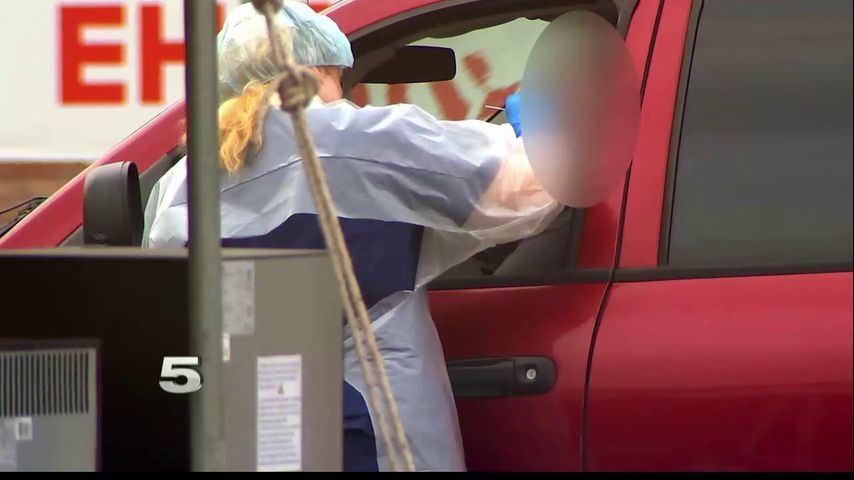Experts explain different types of coronavirus tests
In an attempt to speed up coronavirus testing, cities and counties in South Texas are scrambling to buy so-called “rapid test” kits. Doctors, though, are finding them both difficult to obtain and a gamble to purchase.
The city of Laredo and Webb County agreed to pay nearly $188,000 for 5,000 rapid coronavirus test kits, which promised faster results than traditional laboratory testing. The city and the county, however, canceled the order after the rapid tests proved unreliable.
“We had been told by the manufacturer of the tests and the literature that it was 93% or 97% effective, which is great,” said Laredo Health Department Director Dr. Hector Gonzalez during a Friday news conference. “But, during our controls, we didn’t like the results that we were getting because they weren’t anywhere near. So, we couldn’t use them, and we decided not to use them, because they weren’t a good product.”
As the number of positive cases began to swell in Laredo, the city began looking for quicker testing options. After meeting with a hospital, a clinic and Clear Choice ER, the city was told Clear Choice ER had 18,000 rapid tests available.
Rapid tests differ from the tests commonly used in South Texas.
In the Rio Grande Valley, tests known by the acronym PCR are the standard at drive-thru testing locations, labs and hospitals.
“The polymerase chain reaction, PCR, test is considered the gold standard right now,” said Hidalgo County Health Authority Dr. Ivan Melendez, who added: “This is a test that you obtain the specimen from your nose.”
That sample is exposed to a reagent that denudes the protein to show the virus’ RNA — ribonucleic acid, which is part of the virus’ genetic code. A second reagent is introduced to multiply the virus and color is added to highlight the virus under analysis.
“It takes longer,” Melendez said. “It’s more, it’s very specific. But you have a spot, many spots on that (supply) chain to run out of supplies. So, that’s why the PCR tests are taking such a long time.
Demand for coronavirus testing created a nationwide shortage of supplies.
Dr. Bruce Akey, the director of Texas A&M’s Veterinary Medical Diagnostic Laboratory, wanted to help.
“We took a look at what was in our shelves,” Akey said, “and we found some of the materials that can be used to do this.”
Texas A&M donated supplies usually used to test pigs, cows and chickens, and prepared them in kits for shipping statewide. McAllen is set to receive 100 of the kits next week.
“There’s a swab and there’s a little vial, a screw-top vial, that has some liquid medium in it to protect the sample while it’s being shipped to the laboratory,” Akey said. “And that’s what we’re sending out.”
Rapid tests cut down on the time a test spends in the lab by testing for antibodies.
“What this test does is it measures the sample that you obtain from a person, also through a swab, to see if you have developed an antibody against, in this case, COVID,” Melendez said. “That means you’ve been in contact with it.”
Rapid tests, though, are also in high demand.
“So, that test would be beautiful. The problem is New Jersey, New York, California, perhaps New Orleans, these are the places that will be getting it within a week to 10 days,” Melendez said. “I can’t tell you how long it’s going to take for us to get it, but we are definitely not at the front of the line.”
Counties in the Valley have not had much luck obtaining rapid tests.
Hidalgo County is still using PCRs. Starr County’s health authority, Dr. Jose Vazquez, said the county is on a wait list. Cameron County Judge Eddie Treviño Jr. said he’s taking a wait-and-see approach.
“I can say that I’m not aware, but I’m hearing as many different stories as you are,” Treviño said during an interview earlier this week. “We need everybody to look into them before they jump, especially before they spend any money.”
Treviño’s suspicion proved prescient when, days later, Laredo announced the rapid tests acquired through the city-county partnership were faulty.
U.S. Rep. Henry Cuellar, D-Laredo, facilitated the deal between the city and Clear Choice ER that allowed the sale of 2,500 tests at $75 apiece. Clear Choice ER donated another 2,500.
The city and county planned to split the cost and ask the Federal Emergency Management Agency to reimburse them for 75% of the purchase price.
City officials said Laredo didn’t lose any money, because they had not purchased the full number of tests.
Cuellar said in a statement: “Although I wanted to see my district receive the appropriate testing kits that they now still require, I want to thank our federal regulatory agencies for removing these specific products from the market place.”
Laredo did not disclose which company manufactured the faulty test kits.
Doctors in the Valley are independently acquiring rapid tests. A physician’s office in the Valley is waiting on a shipment of hundreds of tests, according to proof-of-purchase records reviewed by CHANNEL 5 NEWS.
The office is expecting the shipment by the end of the month. A representative said they’re mainly used to test for negative results. Positive results would require further testing.
Melendez, the Hidalgo County health authority, stressed that tests are just part of a multi-pronged effort to slow the spread of COVID-19. Officials also want people to stay home whenever possible and self-quarantine if they come into close or prolonged contact with people who test positive.
“I really would like that the population to not focus so much on absolute number of tests. ‘How can I get tested? Where can I get tested?’ Because, the treatment is going to be the same,” Melendez said. “It’s just a matter that you don’t expose other people.”





